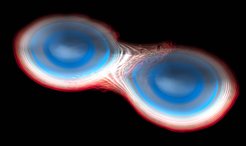Tim Dietrich receives ERC Starting Grant for exploring binary neutron stars
Tim Dietrich, Professor at the University of Potsdam and Max Planck Fellow at the Max Planck Institute of Gravitational Physics, receives a European Research Council (ERC) Starting Grant worth 1.5 million euros for his research project “SMArt” (“From Subatomic to Cosmic Scales: Simulating, Modelling, and Analyzing Binary Neutron Star Mergers”).
Neutron stars, remnants of supernova explosions of massive stars, are among the most compact objects in our Universe. Dietrich’s research focuses on studying the collision of two neutron stars. Although a rare event, scientists expect to observe an increasing number of observations in the near future when the gravitational-wave detectors Advanced LIGO, Advanced Virgo, and KAGRA are back online with improved sensitivity after a three-year upgrade.

With the help of the ERC grant, Dietrich and his group will work on two important open questions in modern physics: “What is the nature of matter at supranuclear densities?” and “What is the expansion rate of our Universe?” These open questions of nuclear physics and cosmology can be answered with observations of various cosmic signals of merging binary neutron stars. The window to study these fascinating events has only recently been opened with the upgrades of the gravitational-wave observatories Advanced LIGO and Advanced Virgo and by combining gravitational-wave information with that of powerful telescopes in the electromagnetic spectrum – from infrared, to optical, to gamma-rays. In 2017, the gravitational-wave detectors caught the first signal from a binary neutron star merger and about 70 astronomical observatories on Earth and in space were involved in follow-up observations and investigated electromagnetic signals of this event.
“We are currently at a crossroads where the development of accurate and robust theoretical models is crucial to keep up with the development of experimental instrumentation,” says Dietrich, “without noticeable upgrades of our models, future analyses will be biased through modeling uncertainties.” Therefore, the ERC project will focus on developing new and more advanced models to interpret binary neutron-star coalescences. For this purpose, Dietrich and his group will use novel techniques to improve the accuracy of their numerical-relativity simulations. Because of their complexity, such simulations typically run on large high-performance computing facilities. Based on the new simulations, Dietrich and his research group will model the gravitational-wave and electromagnetic emission from binary neutron star mergers with higher accuracy and connect theoretical computations with observational data.
Tim Dietrich studied physics at the Martin Luther University Halle-Wittenberg and the Friedrich Schiller University in Jena, where he also earned his doctorate in 2016. He has been a postdoctoral researcher at the Max Planck Institute for Gravitational Physics (Albert Einstein Institute) and a Marie Sklodowska Curie Fellow at Nikhef, the Dutch National Institute for Subatomic Physics. Since February 2020, Dietrich is an assistant professor for Theoretical Astrophysics at the University of Potsdam and since July 2021 Max Planck Fellow at the Albert Einstein Institute. Dietrich has already won several prizes, including awards for his dissertation from the German Physical Society and from the University of Jena, the Heinz Billing Prize for the Advancement of Scientific Computing, and last year's Heinz Maier-Leibnitz Prize.
ERC Starting Grants
In 2022, the European Research Council provides a total amount of 636 Million Euro to support 408 ERC Starting Grants. The Grant, which is intended for financing a research group for top young scientists, is much coveted and competition is strong: of the 2,932 applications, only about 14% are approved. For his research, Tim Dietrich will receive about 1.5 million euros during the coming five years.












